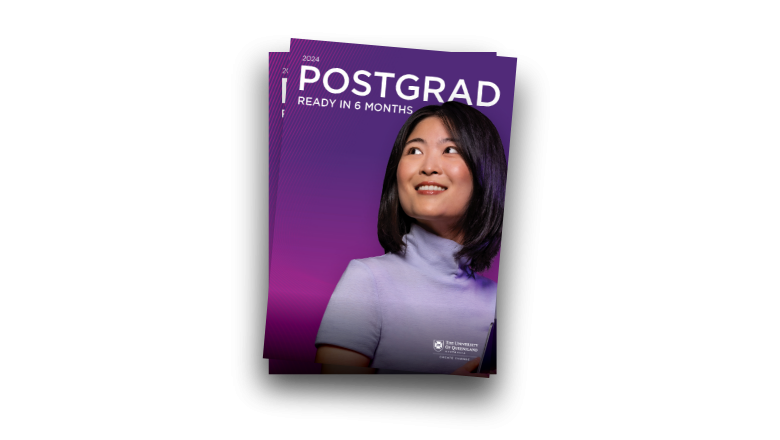How hard is a master’s compared to a bachelor’s degree? Not that difficult, according to UQ graduate Jessica Rowen. But the time commitment to return to studying requires careful consideration, so she’s compared the pair to help you understand what you’re in for.
If you’ve completed a bachelor’s degree, the choice to undertake postgraduate study can feel daunting by comparison. Upskilling your expertise and acquiring specialised field-relevant experience is certainly a worthwhile goal, but you might worry that a master’s degree is going to be much tougher than your bachelor’s was.
The good news is, if you have a bachelor’s degree, a master’s degree isn’t the intimidating task it appears. A master’s course load can be the gateway to better opportunities and promotions, and the assessment is more similar to its bachelor’s counterpart than you might think.
How hard is a master’s compared to a bachelor’s degree?
When I began my master’s degree, I was worried. I had no idea if I could compare my undergraduate experience to the intimidating postgraduate workload I had imagined up.
I’d loved my Bachelor of Arts for so many reasons:
- the lecturers were engaging
- the lessons were insightful
- the broad scope of content appealed to me.
Yet post-graduation I found myself facing a world in the midst of a pandemic, and I was unsure how to navigate it. I decided returning to study solved my immediate need for routine, and I was relieved to return to the St Lucia campus, where I discovered my worries about the pitfalls of postgraduate study were for naught. Instead, the coursework was manageable, my lecturers and tutors were kind and considerate just as they had been in my undergraduate, and I was surprised at how deeply I enjoyed my return to study.
What about my job?
Doing a master’s degree while working full-time is surprisingly possible. With virtual and external learning options now easily accessible, there’s more flexibility than ever to begin your postgraduate journey. A lot of postgraduate students customise their workload and study part-time to manage their own schedule.
Whether you start with a graduate certificate, graduate diploma or master’s degree, all postgraduate programs value experience and accept applications from professionals with relevant experience or merit. In fact, a graduate certificate is a great pathway back into study for those unsure about returning.
Bachelor’s degree vs master’s degree
While a bachelor’s degree creates the foundation of knowledge needed to succeed, a master’s degree elevates this further.
Undergraduate study often encompasses a large field of study from business to communications and beyond, while postgraduate options can be specialised and targeted to an individual’s needs and niche interests. Building on the coursework of a bachelor’s degree, a master’s or graduate certificate takes study to the next level, concentrating on how to use these skills in the workplace and beyond.
Keep in mind that you can do a master’s degree in a different field to your bachelor’s degree. If your career has stalled, a master’s degree offers the chance to redirect and restructure your career growth – something a new bachelor’s degree doesn’t quite provide. And while some master’s courses will require a related bachelor’s degree to begin, it isn’t always required for them to be in the same field or faculty if you have equivalent work experience.
In truth, I found the workload more enjoyable because I had found my niche, something my undergraduate with its multitude of electives hadn’t given me. I loved the Writing, Editing and Publishing postgraduate program, because I was passionate about writing and working in publishing.
Is a master’s degree better than a bachelor’s degree?
So, is a master’s degree better than a bachelor’s degree? It depends what you intend to use it for.
A master’s degree workload is similar to a bachelor’s degree in many ways. Both require focus and determination, but a master’s ultimately encompasses the necessary skills many professionals need to grow, especially in uncertain times.
A bachelor’s degree is no more or less challenging than a master’s; it is simply a different area of study focus. Both are platforms for networking and professional growth with real-world teaching.

How will a master’s degree benefit me?
So, you’re wondering, “how will a master’s degree benefit me?”
Short answer: lots of ways.
A master’s degree opens the door to networking and personal growth. In recent years, postgraduate opportunities have grown as new skills are required. Technology and communication have changed drastically in the past few years and, in turn, many professionals are returning to study for personal and professional growth to stay on top of the new developments in their industry.
Why a master’s degree? A master’s degree has immeasurable value, whether you’re considering changing career paths or improving your trade knowledge. Aside from your new qualification, a postgraduate course like a master’s degree presents the chance to create personal connections with fellow students. Between guest speakers and placement opportunities, you’ll also get unique insight into your area of study and an offer of industry-specific work experience that only postgraduate studies can provide.
In addition, there are definite real-world benefits to undertaking a master’s degree, with studies showing postgraduate students tend to have higher salaries compared to their bachelor’s degree co-workers as well as a higher employment rate post-study.
As I near the end of my master’s, I’m proud to say I feel more confident in my skillset than ever before. My time at UQ has been invaluable to my personal development and growth, and I wouldn’t trade it for the world.
Ready to start your postgraduate journey?
There are many reasons to begin your postgraduate studies, and they are specific to you and your values. As the world re-opens, a master’s degree is an asset toward future-proofing your skillset.
If you’re preparing for a master’s degree, we have a large collection of postgraduate study options to choose from, and it’s never too late to redirect your career or learn new skills.
Browse our postgraduate programs today to start your journey








